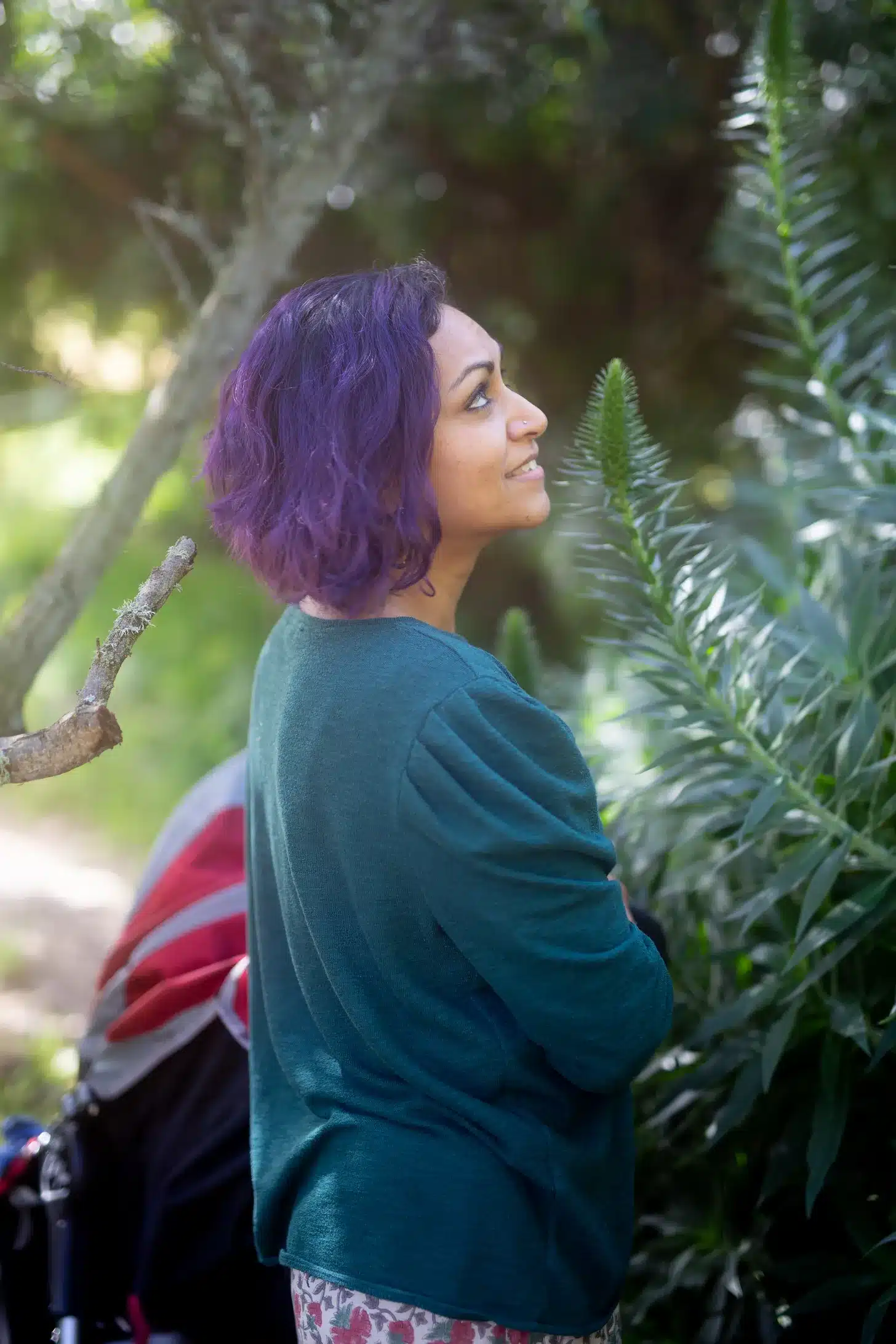
I’ve lived with bipolar disorder for the last 13 years. Though the initial years were brutal, once I understood my triggers and what it takes to stay well, I’ve been privileged to have stayed healthy for much of the last decade. This included — to my relief — my first pregnancy and post-partum period and serving in high-intensity public health roles through the pandemic, as California’s Acting Surgeon General and previously the office’s first Chief Health Officer.
Today, I live with bipolar disorder as a chronic and very manageable health condition. My hope is, with the insights and skills I’ve built, I can stay well for the majority of my life.
Many structural factors can prevent us from achieving optimal well-being and our potential — including poverty, racism, and discrimination — so already vulnerable people disproportionately suffer from the impacts of undertreated mental illness.
While systemic changes are certainly needed to advance health and mental health broadly, I’d like to share nine individually oriented lessons I’ve gained, most the hard way.
1 . You can’t rush recovery.
One of the agonizing parts about being unwell is that you can’t predict when it will end.
You can’t always trust the thoughts you have about whether or when you will recover — in the midst of it, it can feel like you may never be well again.
Try your best to let these thoughts pass over you without buying into them. Tell the disbeliever in you that you’ve been well before and while you don’t know how long it’ll take, you will be well again. If helpful, enlist a loved one to remind you of this.
Try to be patient with yourself and the process.
And be kind to yourself — challenge yourself to speak (and better yet, write) to yourself the way you would to a dear friend.
When you’re well, take note of the positive, encouraging beliefs you have about your ability to stay healthy — and your strengths. Jot them down to refer to when you’re feeling unsteady.
2. When things are hard, set small goals and celebrate the small wins.
It’s downright alienating to have your brain highjacked by illness. Things that once felt effortless — shopping for groceries, reading, phone calls — are hard.
If you’re in this place, make small, achievable goals: maybe taking a shower, walking around the block, or listening to a favorite song. Don’t set yourself up for disappointment by making well-time goals like writing a coherent article.
And let yourself celebrate — really celebrate — the small wins. Hug yourself, clap loudly, write yourself a congratulatory note.
These small wins will gradually lead you to bigger and bigger ones as you get better.
3. Normalize time off for mental health. And trust your gut.
It can often help our mental health to have work or school to ground and focus us.
But sometimes, especially in the midst of an illness episode that affects thinking or social behavior, it can be counter-productive to try to work or study while also trying to get well.
Trust your gut about how you (or a loved one) are doing, what you can and cannot do, and what you need in order to get well.
When letting supervisors know about needing time away, you don’t have to go into details — you can use a general term like “a health issue.” It might help to write down what you would communicate if you were sick while you’re well. And to run it by loved ones.
One guideline I love is to pause on revealing your diagnosis or treatment details while you’re in the thick of an episode — because you might want to do it differently when you recover.
Sometimes you’ll need to extend a leave you’ve taken because (per number 1): there’s no fixed timeline for recovery. Try to not feel guilty or undeserving of the time — you’d do the same if you had pneumonia or a broken bone that wasn’t improving as quickly as you’d hoped.
4. Ask for and accept help — and tell loved ones how best to support you.
Community and connection are key to well-being. Don’t hesitate to lean on your loved ones when you’re unwell — even though this can be hard.
This is a theme: make plans ahead of time for what you might do or need when you’re sick. You can always update or change these plans in the moment.
Think about who could help you and in what ways — for instance, with day-to-day needs like cooking or childcare — or asks like accompanying you to the doctor (it can be overwhelming to process information and advocate for yourself when you’re unwell).
And then ask specific people for these specific kinds of help. Try not to feel guilty for ‘imposing’ — your loved ones want you to be better and to know how to help you get there.
When you’re well, you’ll be able to give back in all the ways you’re receiving help now. Peer support can be an especially powerful way to come to terms with your journey and empower others to navigate theirs.
5. Keep your own records.
The very nature of our current healthcare system involves fragmentation of information across systems, especially when we move our care across the country or world.
For now, the best way to counteract this is to become record-keepers for ourselves (or with loved ones’ help).
Ask for discharge summaries after hospital stays and treatment summaries as you wrap up with particular clinicians. If you’re so inclined, add key details to a single (bulleted and brief) summary document of your history: a timeline of episodes (triggers, symptoms, duration), treatments, and recovery. Add medications and other therapies you’ve tried, side effects, and impact. Add your other medical conditions, surgeries, and medication allergies.
When you’re in an illness episode, change only one thing at a time and move slowly. As you try different medications or behavioral strategies, keep note of how you’re doing day to day: rate your mood, energy, sleep, and other symptoms. On looking back, you’ll more readily discern patterns and understand how a change is working, as well as what it’s helping with specifically.
Also document side effects: these will often fade or intensify with time, so the look back is valuable.
It’s also invaluable to log your lab results in a shareable format like a table or spreadsheet to keep all this essential information in one place — to help you and your treatment team (and future clinicians and loved ones) make better data-based decisions. Labs can be especially hard to compare across systems — you’ll be so glad you have this snapshot.
6. Create space for joy.
When you’re well, build a “joy toolkit” to keep feeling your best — and hone your unique strengths. Make a list of who and what make you feel joyful and grounded, and intentionally build space for them. Protect time for joy and laughter, connection, meaning and reflection, creativity, and healthy habits like exercise and time in nature.
As a toddler’s parent, I’m well acquainted with the ever-present time crunch and am a big advocate for fitting this toolkit within your life’s realities.
Activating joy for me can be as simple as changing what I’m paying attention to during daily moments: intentionally tuning in to the heat of the shower water or savoring the birdsong and sunshine while walking to daycare — and being present during a tickle fest.
7. Create a ‘red flag’ toolbox.
Check in with yourself often (via a journal, reflective walk, or other tool) — to discern any fluctuations in well-being and early warning signs of an illness episode. Rely on loved ones to help, especially early in your journey.
When you’re heading into red-flag territory, figure out what elements of your joy toolbox — and a ‘red flag’ toolbox — you need to activate to return to baseline.
It may be extra rest; time away from certain obligations or social media; a boosted medication; seeing a clinician or loved ones. Experiment with what works for addressing what kinds of symptoms. With time, you’ll hopefully gain tools to pull yourself back to wellness when an episode is just beginning and is easiest to quash.
8. Protect your sleep and energy.
It’s hard to overstate how essential sleep and energy are for well-being.
In addition to classic sleep hygiene, strategic use of exposure to light and dark can be extremely beneficial and stabilizing.
Exposure to natural sunlight early in the day helps optimally set our mood, alertness, immune function, and sleep-wake cycle, enabling higher-quality sleep at night.
At night, keep the lights dimmed and wear blue light-blocking glasses to reduce exposure to the wavelengths of light that wake us up by turning off the sleep-inducing hormone melatonin and disrupting sleep.
People talk often about protecting your time; fewer talk about the importance of protecting your energy, which I’ve found even more central to well-being.
Reflect on what gives you energy and what depletes you — and make a concerted effort to balance your time between these buckets of activities, making sure to emphasize the former.
To the extent you can, think through and set up boundaries (at work, in relationships, in your days) that will proactively protect your energy. For example, some people block time on the calendar to decompress from intense activities (that deplete energy) and for replenishing work like thinking or creating.
Practice rest intensively. For instance, I give myself a full weekend day away from my phone and without external plans, to reconnect and recharge with family.
9. Practice self-compassion.
Anyone with a chronic health condition knows it takes intentional, regular work to stay healthy. It also takes self-knowledge, self-acceptance, and a healthy dose of self-compassion.
Expect ever-present bumps in the road — including times when you feel unsteady and even unwell, and experiences that are less than ideal. While responding to these bumps, exercise your muscles of forgiving and loving yourself through all these phases.
And name and nourish your unique assets — forged through your unique journey. Your inner light is yours alone.
Nobody can be perfect — so give yourself grace for making mistakes and sometimes being unwell. You are perfectly imperfect.
And you’re worthy of acceptance and love (from yourself, most of all) just as you are.




